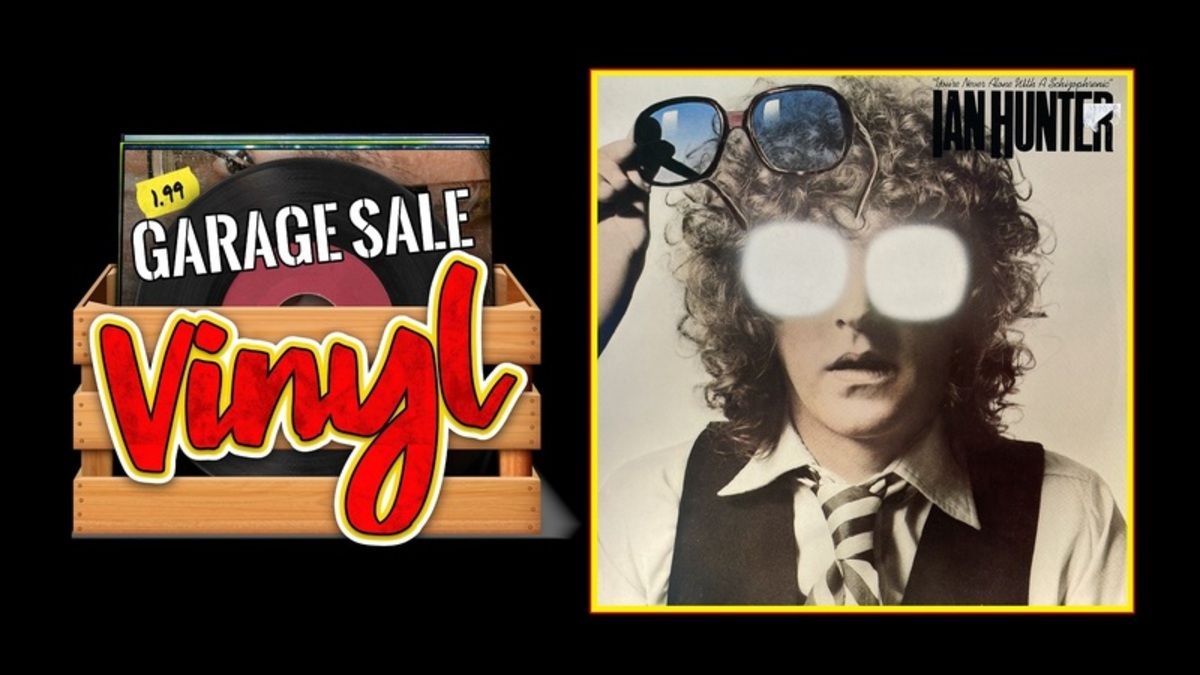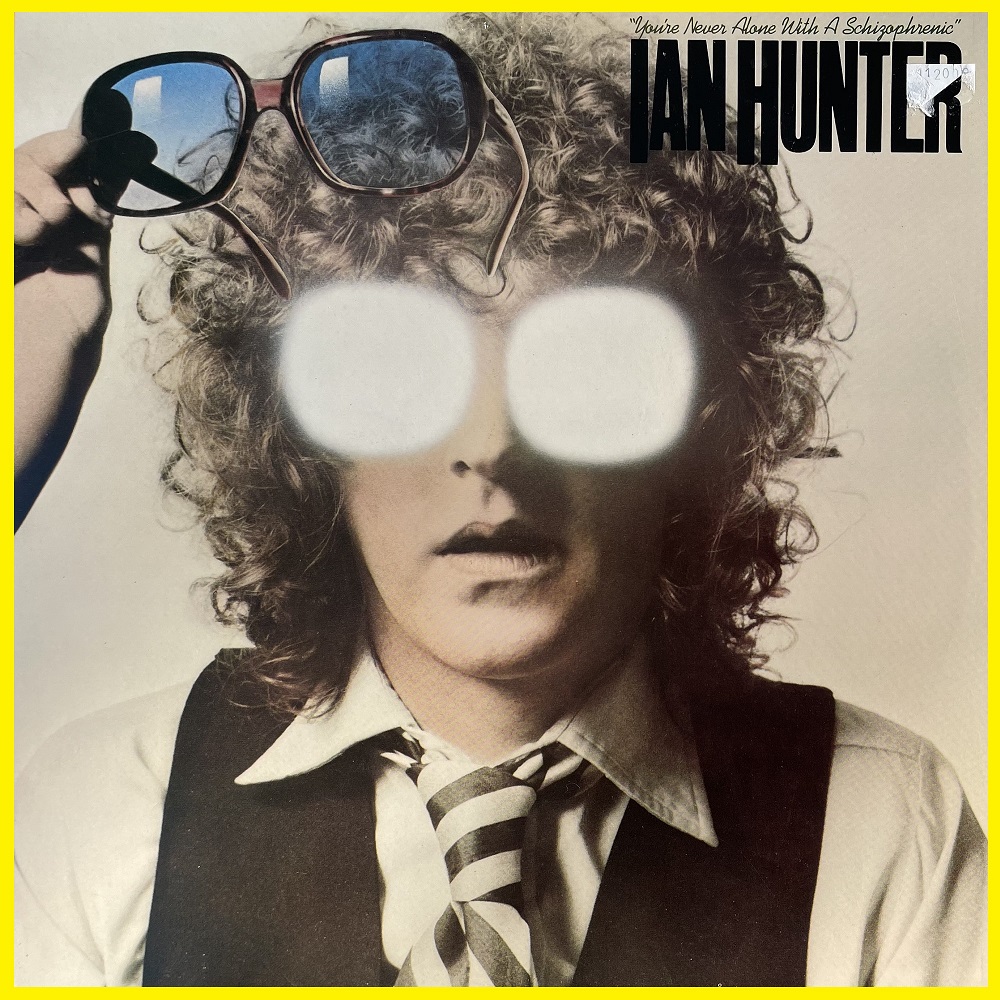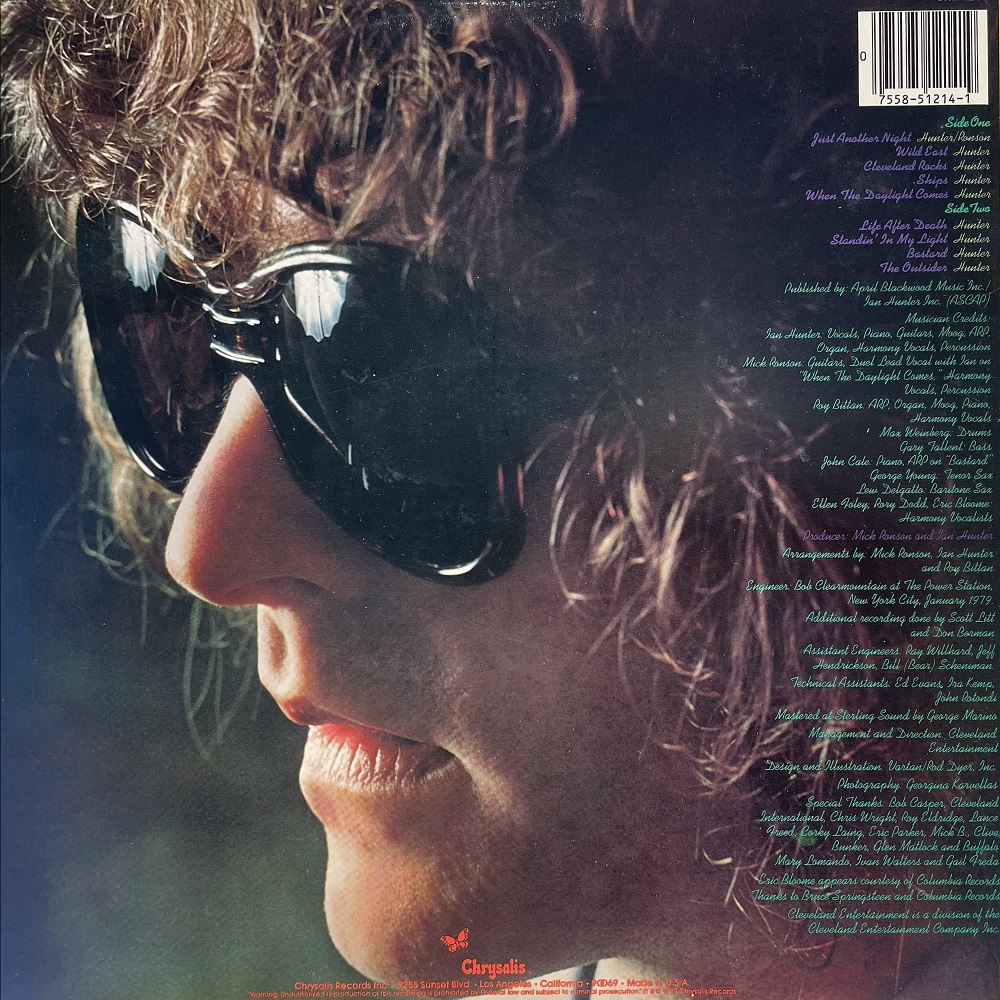
Garage Sale Vinyl: Ian Hunter
You’re Never Alone with a Schizophrenic / Chrysalis / March 1979
by Christopher Long
In today’s oft-tight times, who doesn’t love a good bargain? And if there’s ONE thing I’ve learned over the last couple of years while rummaging through garage sales, thrift stores, and flea markets, it’s that you DON’T have to mortgage the condo in order to score reasonably well-cared-for used classic vinyl LPs.
Not too long ago, the GF and I made an hour or so pilgrimage from her funky abode in Palm Bay, Florida to the massive, sprawling flea market up in Mount Dora. Among the seemingly endless vendors was a cozy used vinyl concession. As we perused the impressive inventory, I spotted a separate section beneath a handwritten sign that read, “6 for 20.” Although math never was my strongest subject in school, even I could figure this one out. Hmm. That’s like only three bucks a piece! In short order, we both began stuffing plastic grocery bags provided by the friendly concession owner. And boy did we grab a bunch of goodies — Rod Stewart, Janis Ian, Bob Welch, Linda Ronstadt, Leo Sayer, and Ian Hunter, to name just a few.

You gotta feel bad for today’s young people. And when I say, “young people,” I’m speaking directly to those kids under 40. For the most part, they’ve missed out on the fun factor regarding the discovery of new music. It’s supposed to be a personal, beautiful, wonderful, and organic experience. Back in my day, during the mid to late 1900s, we didn’t have fancy Google machines to instruct us as to what we were mandated to know about and embrace. To me, that’s plain cray-cray! We had to pay attention to trusted radio DJs for the latest 411. We read record reviews and other related articles created by compelling music writers and journalists — printed in the pages of tangible, glossy, full-color magazines. Lester Bangs forever, baby! PLUS, we had weekly TV shows that featured LIVE performances from the latest and greatest music artists, back when the term, “music artist” meant something, important. But I digress.
Spring, 1979. I’d become thwacked by a particular new track being played on my preferred Orlando rock station. The distinctive, honest-sounding lead vocals pinned to the pure, rib-cracking guitars forced me to pay attention, as “Just Another Night” ripped through my radio speakers. One of the “young people” myself at the time (16 to be exact), I was too young to have connected with Mott the Hoople the first time around. Who the heck is Ian Hunter? Fortunately, when it came to rock and roll (in those days) I was a quick study.
Boasting a rather cool-looking and quite eye-catching artist headshot cover photo, You’re Never Alone with a Schizophrenic (what an incredible title) was Hunter’s fourth solo studio album following his 1974 split from the Hoople. A production collab between Hunter and former David Bowie guitarist, Mick Ronson, the nine-track collection owned some of Hunter’s finest and most infectious songs. As a result, the record received significantly greater airplay than his previous solo efforts, which finally placed Hunter on my personal rock radar.
I first bought the record on vinyl shortly after its initial release. In those days, at just $5 a pop, you could experiment, buying random LPs based solely on a cool cover or an intriguing magazine ad. I was earning a staggering $30 a week from working part-time at the neighborhood record shop. Hence, I could afford to buy three or four new albums each payday and still have enough scratch left over to gas up my dad’s Pontiac station wagon and take in a motion picture show with that little gal from ‘round the way. You could do all of that stuff back in nineteen-hundred and seventy-nine.
Additionally appealing, You’re Never Alone with a Schizophrenic featured an array of all-star players, including several cats from Springsteen’s troupe. Roy Bittan’s purposeful piano work was perfectly precise. Garry Tallent’s slinky bass grooves combined with Max Weinberg’s big bang drumming made for a mighty rhythm section. Ellen Foley brought glorious Gospel-tinged back-ups and the harmony vocals from Blue Öyster Cult guitarist Eric Bloom provided an extra layer of icing on the cake.
Of the record’s numerous other highlights, the sax-injected “Wild East” was sexy and street-smart, while “When the Daylight Comes” resided comfortably between edgy rock and catchy pop. Another instant album standout, “Cleveland Rocks” would achieve greater notoriety in the ’90s when it was covered famously by The Presidents of the United States of America and ultimately became the theme song for the popular American TV sitcom, The Drew Carey Show. Another of the record’s singles, “Ships” felt deeply personal and sounded rather haunting. It too experienced significantly greater chart success when it was castrated and then released as a single by Barry Manilow in late ‘79. However, it was the urgent “Life After Death” and the soaring “Standin’ in My Light” that spoke (and still speak) to me the loudest.
(5/5) ⭐⭐⭐⭐⭐

You’re Never Alone with a Schizophrenic Track List
SIDE ONE
- Just Another Night (Hunter, Ronson) – 4:36
- Wild East (Hunter) – 3:58
- Cleveland Rocks (Hunter) – 3:48
- Ships (Hunter) – 4:11
- When the Daylight Comes (Hunter) – 4:27
SIDE TWO
- Life After Death (Hunter) – 3:49
- Standin’ in My Light (Hunter) – 4:35
- Bastard (Hunter) – 6:37
- The Outsider (Hunter) – 5:57
https://ianhunter.com












